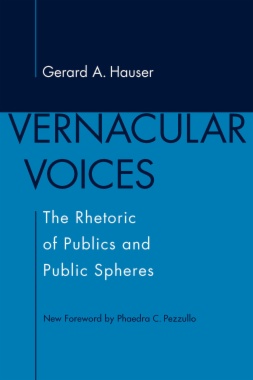An award-winning study of how formal and informal public discourse shapes opinions
A foundational text of twenty-first-century rhetorical studies, Vernacular Voices addresses the role of citizen voices in steering a democracy through an examination of the rhetoric of publics. Gerard A. Hauser maintains that the interaction between everyday and official discourse discloses how active members of a complex society discover and clarify their shared interests and engage in exchanges that shape their opinions on issues of common interest.
In the two decades since Vernacular Voices was first published, much has changed: in the aftermath of the 9/11 terrorist attacks, US presidents have increasingly taken unilateral power to act; the internet and new media have blossomed; and globalization has raised challenges to the autonomy of nation states. In a new preface, Hauser shows how, in an era of shared, global crises, we understand publics, how public spheres form and function, and the possibilities for vernacular expressions of public opinion lie at the core of lived democracy.
A foreword is provided by Phaedra C. Pezzullo, associate professor of communication at the University of Colorado Boulder.
- Cover�������������������������������
- VERNACULAR VOICES�������������������������������������������������������������������
- Title�������������������������������
- Copyright�������������������������������������������
- Dedication����������������������������������������������
- CONTENTS����������������������������������������
- List of Tables����������������������������������������������������������
- Foreword����������������������������������������
- Series Editor’s Preface�������������������������������������������������������������������������������������
- Preface 2022����������������������������������������������������
- Acknowledgments�������������������������������������������������������������
- Introduction: Forgotten Publics�������������������������������������������������������������������������������������������������������������
- Chapter 1 The Public Voice of Vernacular Rhetoric�������������������������������������������������������������������������������������������������������������������������������������������������������������������
- Rhetoric’s Place in the Athenian Democracy
- Civil Society and the Appearance of Public Opinion
- Vox Populi and the Problem of “Public” Opinion
- Rhetorical Antecedents of Publics
- Conclusion
- Chapter 2 Discourse, Rhetorical Discourse, and the Public Sphere����������������������������������������������������������������������������������������������������������������������������������������������������������������������������������������������������������������
- The Bourgeois Public Sphere
- Rhetorical Counterassumptions to Habermas’s Model
- Conclusion
- Chapter 3 Civic Conversation and the Reticulate Public Sphere�������������������������������������������������������������������������������������������������������������������������������������������������������������������������������������������������������
- Outline of a Rhetorical Model of the Public Sphere
- Public Conversation and the Associations of the Reticulate Public Sphere
- Common Meaning and the Associative Networks of the Reticulate Public Sphere
- The Ground of Civil Judgment
- Rhetorical Criteria of the Public Sphere
- Conclusion
- Chapter 4 Reading Public Opinion from Vernacular Rhetoric�������������������������������������������������������������������������������������������������������������������������������������������������������������������������������������������
- Witnessing Vernacular Discourse: An Outsider’s Experience
- Vernacular Rhetoric: The Rhetorical Locus of Public Opinion
- Public Opinion and Reasoning
- Public Opinion and Common Understanding
- The Dialogical Process of Opinion Formation
- Conclusion
- Chapter 5 Narrative, Cultural Memory, and the Appropriation of Historicity����������������������������������������������������������������������������������������������������������������������������������������������������������������������������������������������������������������������������������������������
- Rhetoric and the Active Society
- Memories of Hope: Poland
- Memories of Despair: Yugoslavia
- Contrasting Stories, Contrasting Possibilities
- Conclusion: The Narrative Bridge from Tradition to Historicity
- Chapter 6 Reshaping Publics and Public Spheres: The Meese Commission’s Report on Pornography����������������������������������������������������������������������������������������������������������������������������������������������������������������������������������������������������������������������������������������������������������������������������������������������������
- A Call to Reshape the Literary Public Sphere
- The Final Report: Version I
- The Final Report: Version II
- Reconstructing the Public Sphere
- Conclusion
- Chapter 7 Technologizing Public Opinion: Opinion Polls, the Iranian Hostages, and the Presidential Election�������������������������������������������������������������������������������������������������������������������������������������������������������������������������������������������������������������������������������������������������������������������������������������������������������������������������������������������������
- The Problem of Public Opinion
- Transforming Victims into Heroes
- Public Opinion as Technological Constraint
- Conclusion
- Chapter 8 Democracy’s Narrative: Living in Roosevelt’s America����������������������������������������������������������������������������������������������������������������������������������������������������������������������������������������������������������
- The Election of 1940
- The People’s Letters and Public Opinion
- “Public” Opinion on the Third Term
- Defining America
- Conclusion: Forgotten Publics in a Land of Strangers
- Chapter 9 The Rhetoric of Publicness: Theory and Method�������������������������������������������������������������������������������������������������������������������������������������������������������������������������������������
- Theoretical Considerations
- Methodological Considerations
- Appendix I: Chronology of Hostage Developments����������������������������������������������������������������������������������������������������������������������������������������������������������
- Appendix II: Chronology of the 1980 Campaign����������������������������������������������������������������������������������������������������������������������������������������������������
- Notes�������������������������������
- Bibliography����������������������������������������������������
- Index�������������������������������
- ABOUT THE AUTHOR����������������������������������������������������������������

